The Millionaire Next Door teaches us that wealth isn’t about flashy spending or high income, but about disciplined habits like living below your means, saving steadily, and investing wisely. Many millionaires are self-made, modest, and prioritize financial goals over showing off. Traits such as patience, delayed gratification, and maintaining a humble lifestyle are key to building lasting wealth. If you want to discover more about these proven strategies, keep exploring these insights further.
Key Takeaways
- Wealth is primarily built through disciplined saving, frugal living, and long-term investing, not high income or luxury spending.
- Most millionaires are self-made, modest, and prioritize financial goals over showing off wealth.
- Living below one’s means, avoiding debt, and delaying gratification are common habits among wealthy individuals.
- Asset accumulation and consistent financial behaviors matter more than income level or outward appearances.
- Successful wealth-building relies on patience, planning, and understanding that true wealth is invisible—assets, savings, and investments.
The Millionaire Next Door: The Surprising Secrets of Americas Rich
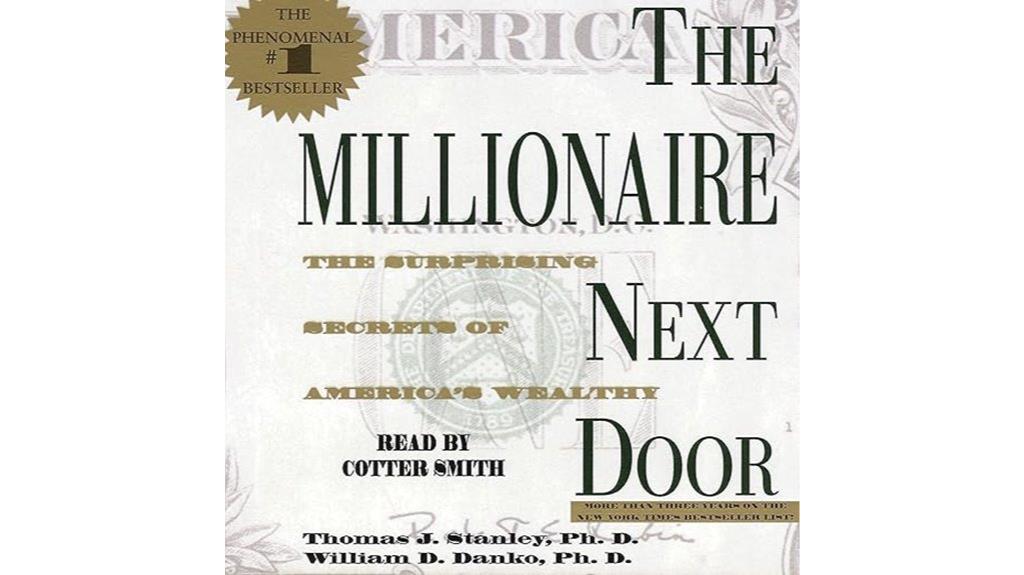
If you’re interested in understanding what truly makes someone a millionaire in America, this book is a must-read. It reveals that most millionaires are self-made and live modestly, not flashy. Their secret isn’t high income but disciplined saving, frugality, and wise investing over decades. They often delay luxury, live in modest neighborhoods, and drive ordinary cars. The key is living below means and practicing delayed gratification. Contrary to popular belief, wealth isn’t about showing off with luxury items—it’s about building wealth quietly through consistent habits. The book challenges stereotypes, emphasizing that modesty and discipline are the real paths to long-term financial success.
Best For: individuals seeking to build wealth through disciplined saving, frugal living, and long-term investing rather than relying on high income or luxury spending.
Pros:
- Emphasizes timeless principles of wealth building such as frugality and delayed gratification.
- Challenges stereotypes about wealth and promotes modesty as a pathway to financial success.
- Provides practical advice for changing consumption habits and establishing disciplined saving routines.
Cons:
- Some statistics and examples may be outdated or less applicable today.
- The emphasis on modest lifestyles may not resonate with those seeking luxury or immediate gratification.
- Certain cultural or political references in the book could be considered non-PC or less relevant in modern contexts.
The Millionaire Next Door: The Surprising Secrets of Americas Wealthy
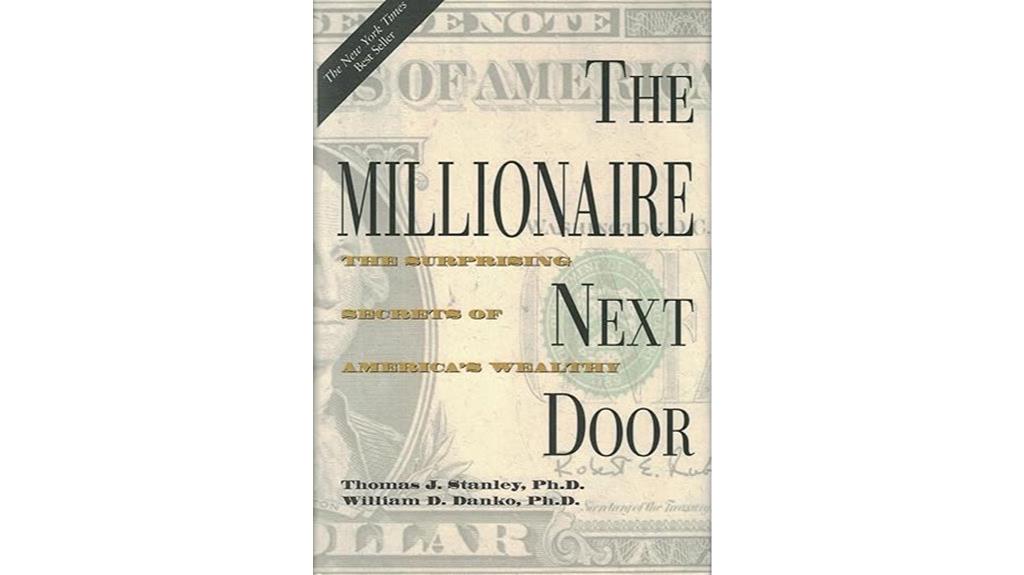
Anyone curious about how ordinary Americans amass wealth will find “The Millionaire Next Door” an eye-opening read. Thomas J. Stanley reveals that wealth isn’t about high income or flashy possessions but about disciplined saving, frugality, and smart investing. The book introduces terms like Under Accumulator, Average, and Prodigious Accumulator of Wealth, showing that even modest earners can become millionaires with proper financial habits. Stanley emphasizes living below your means, avoiding status symbols, and focusing on asset growth. These surprising secrets challenge common ideas, proving that wealth is accessible to those willing to practice discipline and make strategic financial decisions.
Best For: individuals seeking practical insights into building wealth through disciplined saving, frugality, and strategic investing, regardless of income level.
Pros:
- Provides clear, actionable advice on managing finances and accumulating wealth.
- Challenges common misconceptions about wealth, emphasizing attainable strategies.
- Uses simple terminology like UAW, AAW, and PAW to make complex wealth-building concepts understandable.
Cons:
- Contains outdated references to gender roles and societal norms.
- Offers limited guidance on managing and growing accumulated wealth beyond frugality.
- Focuses heavily on lifestyle discipline with less emphasis on diversified investment strategies.
The Millionaire Next Door 1st (first) edition
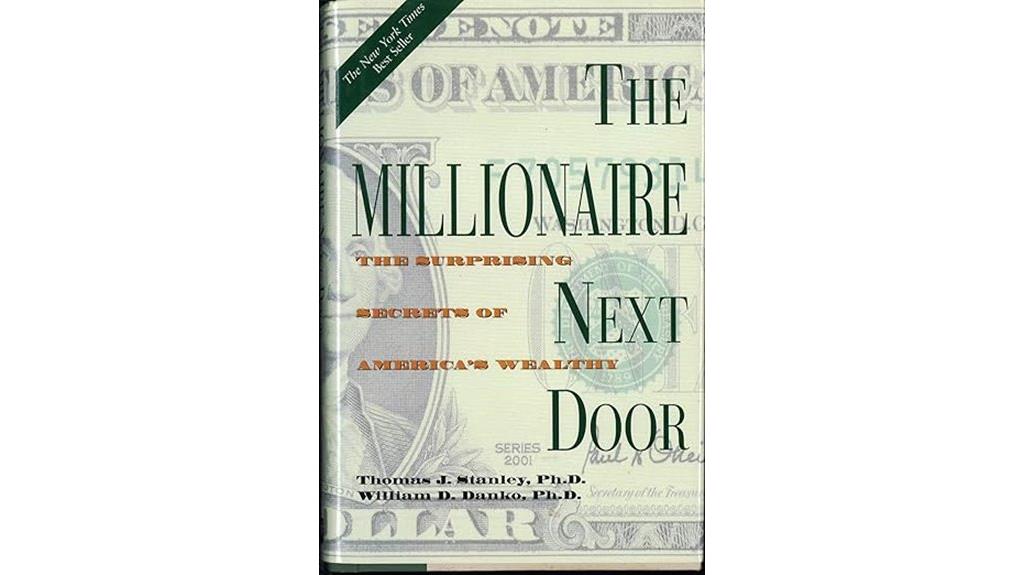
The first edition of *The Millionaire Next Door* is an ideal starting point for beginners who want to grasp the basics of personal finance and wealth-building. Published nearly 30 years ago, it still offers valuable lessons on frugality and disciplined saving. While some critics say it’s outdated and overly simplistic, its core principles—living below your means and responsible money management—remain relevant. However, it lacks modern strategies like credit card rewards or real estate investing. I see it as a solid foundation but recommend supplementing it with current financial advice to navigate today’s economic landscape effectively.
Best For: beginners and those seeking a straightforward, foundational understanding of personal finance and wealth-building principles from a classic perspective.
Pros:
- Provides timeless, common-sense advice on frugality and disciplined saving
- Easy to understand and accessible for financial novices
- Offers perspective shifts that can motivate responsible money management
Cons:
- Outdated in terms of modern financial strategies like credit card rewards and real estate investing
- Oversimplifies wealth-building by emphasizing extreme frugality without addressing smarter spending
- Lacks depth and practical guidance on investment options and current financial tools
The Next Millionaire Next Door: Enduring Strategies for Building Wealth
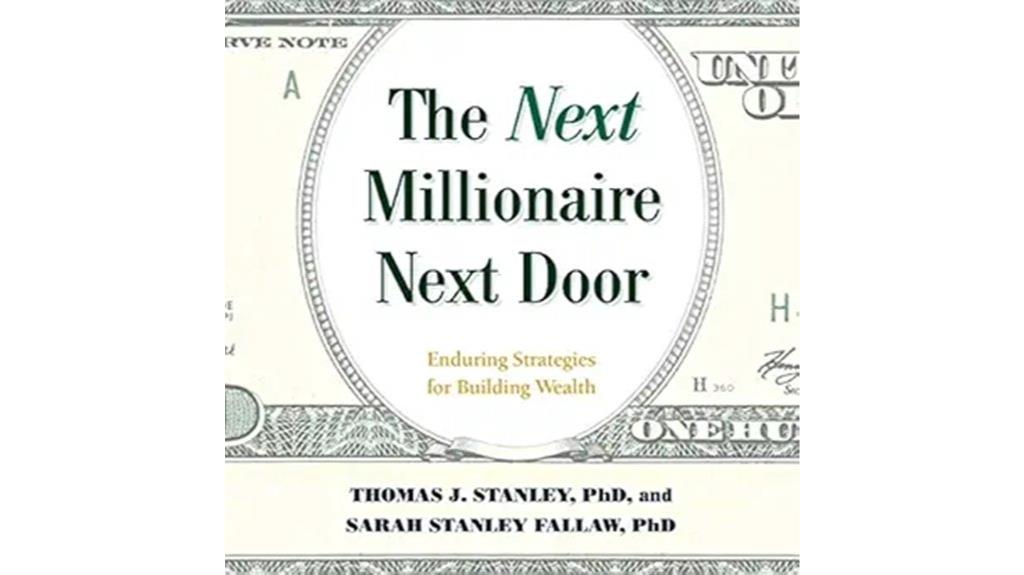
Readers seeking practical, timeless strategies for building sustainable wealth will find “The Next Millionaire Next Door” particularly valuable. This book updates Stanley’s original insights, showing that wealth increasingly comes from the creative class and modern lifestyle choices. It emphasizes that traditional frugality remains essential, but success now also involves social media influence and evolving demographics. The authors highlight responsible habits like saving, avoiding excess, and focusing on long-term goals such as financial independence. While it offers useful modern perspectives, some sections feel repetitive. Still, the core message remains clear: disciplined effort, moderation, and financial knowledge are key to building lasting wealth.
Best For: individuals interested in updating their wealth-building strategies with a modern perspective, emphasizing disciplined effort, responsible habits, and understanding evolving demographics.
Pros:
- Provides updated insights on wealth accumulation in the modern era, reflecting current demographics and influences.
- Reinforces timeless principles like frugality, saving, and responsible financial behavior adaptable to today’s lifestyle.
- Emphasizes the importance of financial education, judgment, and moderation, making it practical for long-term wealth building.
Cons:
- Some sections are repetitive and may diminish engagement or clarity for readers seeking fresh insights.
- The book’s focus on modern influences like social media can be less actionable for readers unfamiliar with digital trends.
- The tone and focus differ from the original, potentially reducing its motivational impact and making it less straightforward.
The Millionaire Next Door
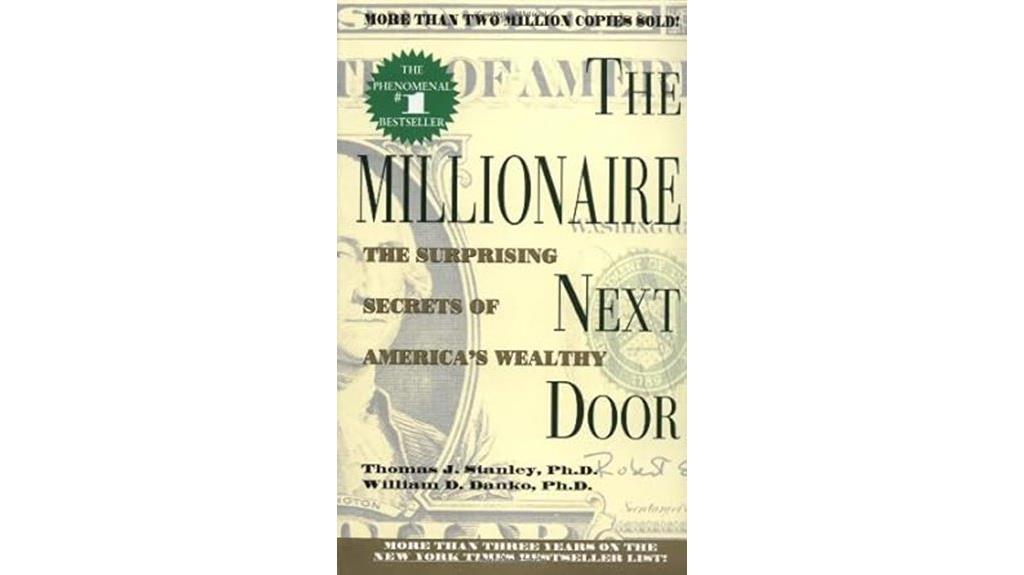
If you’re someone who believes wealth comes from earning a high income or living extravagantly, the insights from “The Millionaire Next Door” will challenge that notion. Most millionaires build wealth by living below their means, making smart investments, and avoiding flashy spending. Their success isn’t driven by high salaries but by discipline, perseverance, and strategic choices. They often choose careers that support wealth accumulation and prioritize saving over showing off wealth. These behaviors prove that anyone can become wealthy with the right habits—living modestly, managing money wisely, and staying focused on long-term goals. Wealth is more about discipline than income.
Best For: individuals seeking to build wealth through disciplined financial habits, frugality, and strategic investments rather than high income or luxury lifestyles.
Pros:
- Emphasizes practical, proven strategies for wealth accumulation regardless of income level
- Encourages disciplined saving, investing, and living below one’s means
- Challenges common stereotypes about wealth and promotes attainable financial goals
Cons:
- Content can be repetitive and lengthy, potentially overwhelming or tedious for some readers
- Some examples and data may be outdated, requiring adaptation to current economic conditions
- Focus on money management and frugality may seem unappealing or exhausting for those seeking a balanced or leisure-oriented lifestyle
The Millionaire Next Door (Millionaire Set)
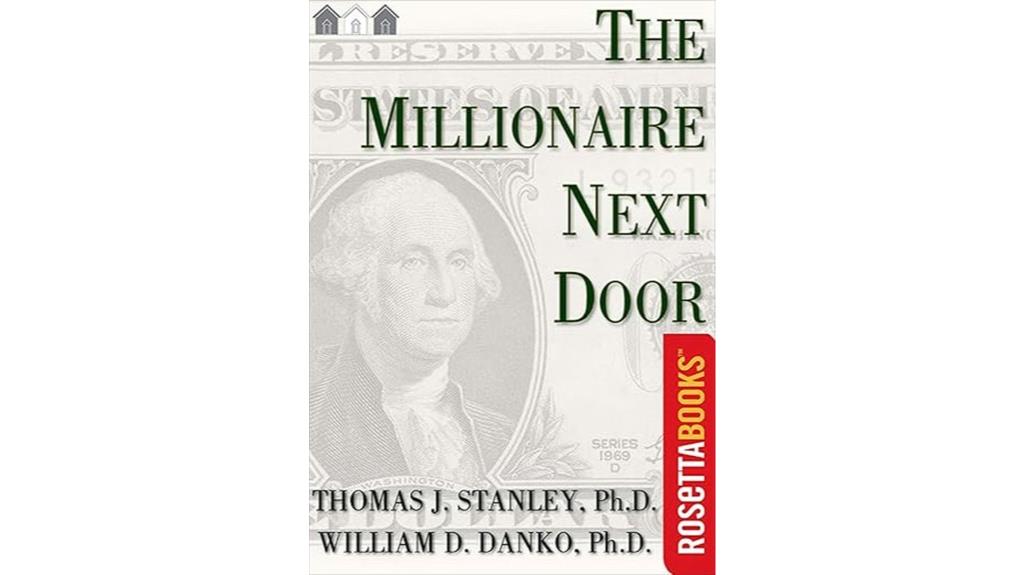
Anyone looking to build lasting wealth without relying on a high income will find the “Millionaire Next Door” insights invaluable. The book introduces the “Millionaire Set,” emphasizing that wealth isn’t about flashy spending but disciplined, consistent saving and investing. It highlights that true millionaires often live modestly, prioritize financial goals, and avoid consumer debt. These individuals focus on long-term planning, managing income wisely, and instilling financial values across generations. The “Millionaire Set” teaches us that anyone can achieve wealth through simple, disciplined habits—reminding us that wealth is a result of behavior, not just income level.
Best For: individuals seeking practical, disciplined strategies for building wealth without relying on high income or consumerism.
Pros:
- Emphasizes simplicity and discipline in wealth building, making it accessible for all income levels.
- Provides real-world case studies and storytelling that enhance understanding of financial principles.
- Offers actionable advice focused on long-term planning, frugality, and financial literacy.
Cons:
- Some examples and data may feel outdated, requiring readers to adapt concepts to modern contexts.
- Certain sections can be lengthy with detailed case explanations, which might challenge readers seeking quick insights.
- The focus on behavioral change might require significant mindset shifts that may take time to implement.
The Psychology of Money: Timeless Lessons on Wealth, Greed, and Happiness
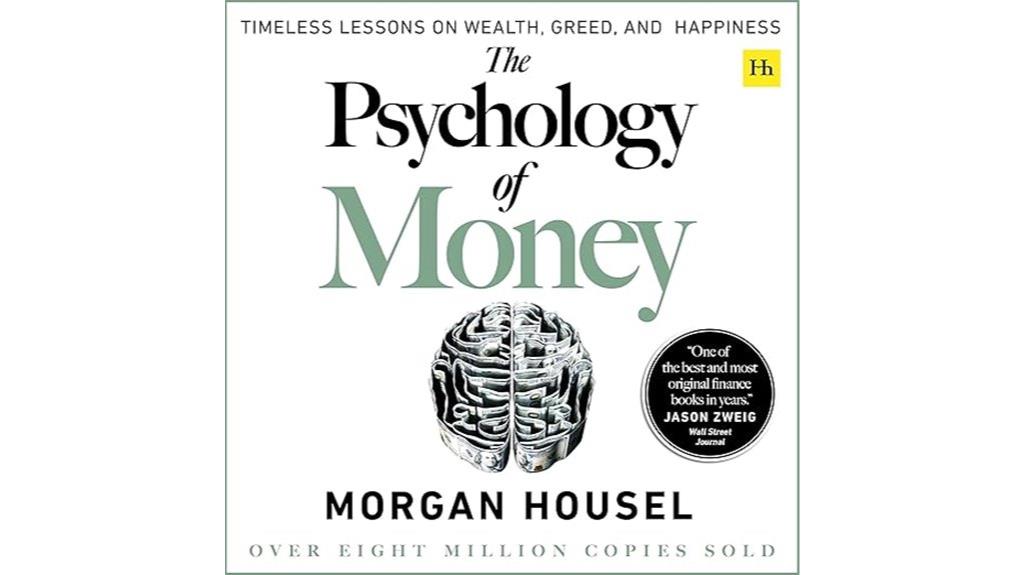
The Psychology of Money offers timeless lessons for anyone seeking to understand the deeper forces behind wealth, greed, and happiness. It reveals that money reflects personal values, and smart decisions alone aren’t enough—emotions and habits matter. Long-term thinking, patience, and the power of compounding often lead to sustainable wealth, not quick wins. Recognizing that wealth isn’t just visible possessions, but what you don’t see, helps shift perspectives. Understanding your psychology—like avoiding greed, fear, and overconfidence—improves decision-making. Humility, planning for uncertainties, and valuing consistent progress over shortcuts are essential for true financial well-being.
Best For: individuals seeking to develop a healthier relationship with money by understanding the psychological and behavioral factors that influence financial decision-making.
Pros:
- Emphasizes the importance of long-term thinking, patience, and consistent habits for sustainable wealth.
- Highlights the role of emotions, personal values, and psychology in financial success, fostering self-awareness.
- Offers timeless practical lessons that help readers plan for uncertainties and avoid impulsive decisions.
Cons:
- May oversimplify complex financial strategies, making it less suitable for advanced investors.
- Focuses heavily on behavioral aspects, which might overlook specific technical investment advice.
- Could be less applicable for those seeking quick financial gains or aggressive short-term strategies.
The Millionaire Next Door: The Surprising Secrets Of Americas Wealthy
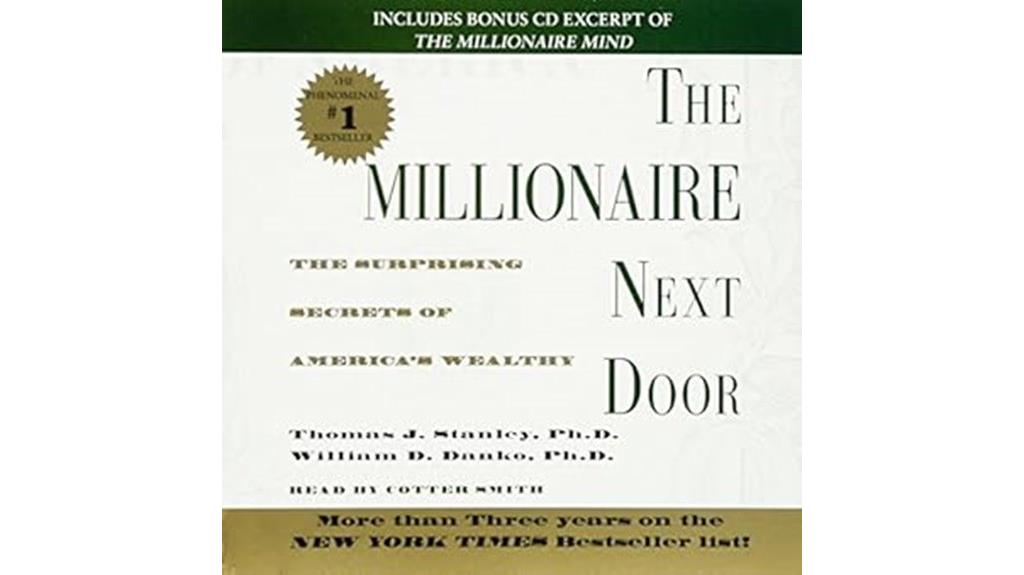
The Millionaire Next Door reveals surprising secrets about America’s wealthy that can change the way you think about building and maintaining wealth. It shows that true wealth isn’t about flashy possessions or high income, but disciplined saving, frugal living, and responsible financial choices. Many wealthy individuals live modestly and focus on long-term goals like family security and financial independence. The book emphasizes living beneath your means, avoiding unnecessary debt, and making smart decisions—principles that are timeless and practical. By adopting these habits, you can build stability and wealth without sacrificing your values or quality of life.
Best For: individuals seeking practical, timeless advice on building wealth through disciplined savings, frugal living, and responsible financial decision-making.
Pros:
- Offers clear, straightforward guidance suitable for all levels of financial literacy
- Emphasizes long-term wealth building and responsible money habits
- Reinforces timeless principles relevant in any economic climate
Cons:
- Original publication date (1996) may make some content feel outdated
- Lacks specific investment strategies or detailed financial planning tips
- Focuses more on behavioral habits than on complex financial products or advanced wealth strategies
CKnotes on the Millionaire Next Door
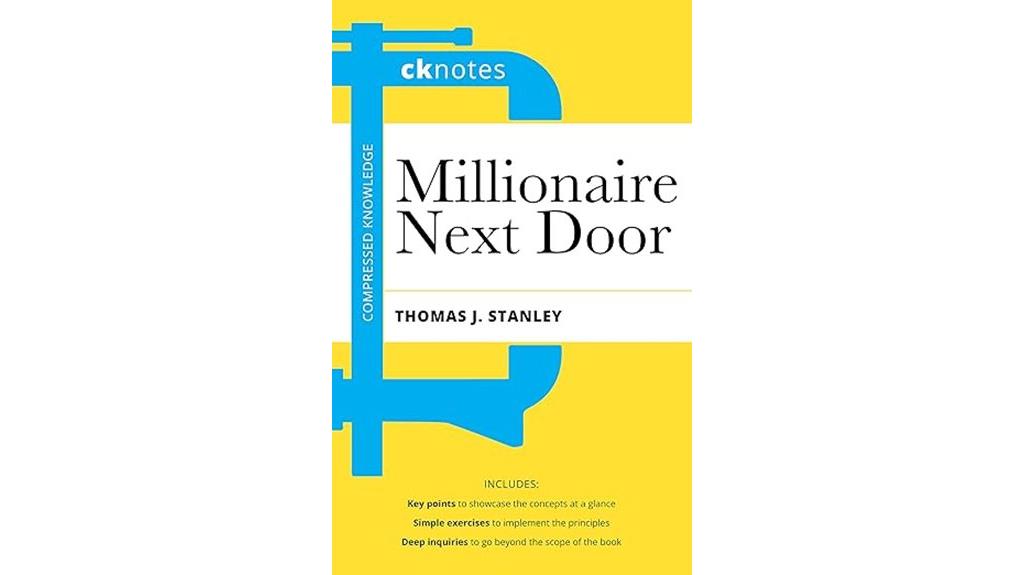
If you’re a busy entrepreneur or someone seeking quick, actionable financial wisdom, CKnotes on *The Millionaire Next Door* is an excellent resource. It offers a clear, concise summary of the book’s core ideas, making complex concepts easy to grasp. The notes focus on key lessons like living below your means, disciplined saving, and long-term investing. They include practical action steps to motivate you toward wealth-building. While some say reading the full book provides deeper insights and stories, CKnotes is perfect for a quick boost of motivation and understanding, especially when time is limited. It’s an effective starting point for financial success.
Best For: busy entrepreneurs and individuals seeking quick, actionable insights into personal finance and wealth-building concepts.
Pros:
- Concise and easy-to-understand summaries that save time for busy readers
- Highlights key principles like frugality, discipline, and long-term investing effectively
- Includes practical action steps to motivate and guide financial habits
Cons:
- Lacks engaging anecdotes and storytelling found in the full book
- May be too brief, missing deeper insights and nuanced explanations
- Some readers find the notes incomplete or less valuable than reading the entire book
Rich Dad Poor Dad Book: Money Lessons from the Rich
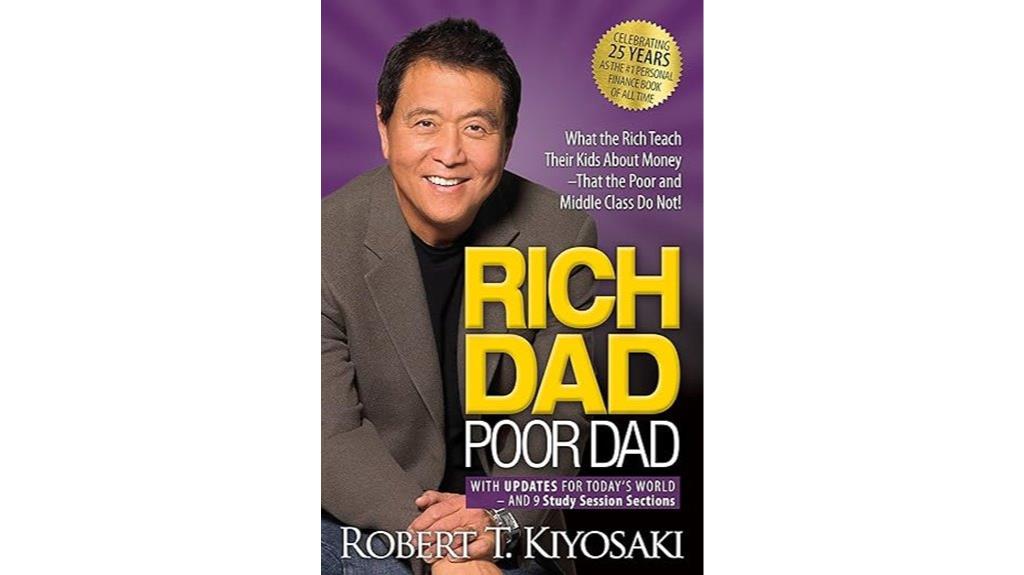
Are you looking to understand how the wealthy think about money and build their wealth? The “Rich Dad Poor Dad” book offers powerful lessons on financial education and mindset. It emphasizes that truly rich individuals can stop working and survive without active income, focusing instead on building assets that generate cash flow. To do this, you must master taxes, overcome fears, take risks, and analyze opportunities early. Surround yourself with knowledgeable people, listen, and act quickly. The book also stresses the importance of distinguishing assets from liabilities and developing a proactive approach to wealth creation. Applying these principles can transform your financial future.
Best For: individuals seeking to understand the mindset and principles behind building wealth and achieving financial independence through financial education and strategic asset management.
Pros:
- Provides clear, accessible insights into asset versus liability distinctions and cash flow management.
- Emphasizes practical strategies like mastering taxes, taking risks, and identifying opportunities early.
- Motivates readers to develop a proactive approach to wealth creation and surround themselves with knowledgeable people.
Cons:
- Some readers may find the concepts require further research or experience to fully implement.
- The book’s focus on mindset may not address detailed investment techniques or specific financial instruments.
- May oversimplify certain complex financial topics for beginners seeking in-depth technical guidance.
The Millionaire & ME: A Teachers Guide To Becoming A Millionaire
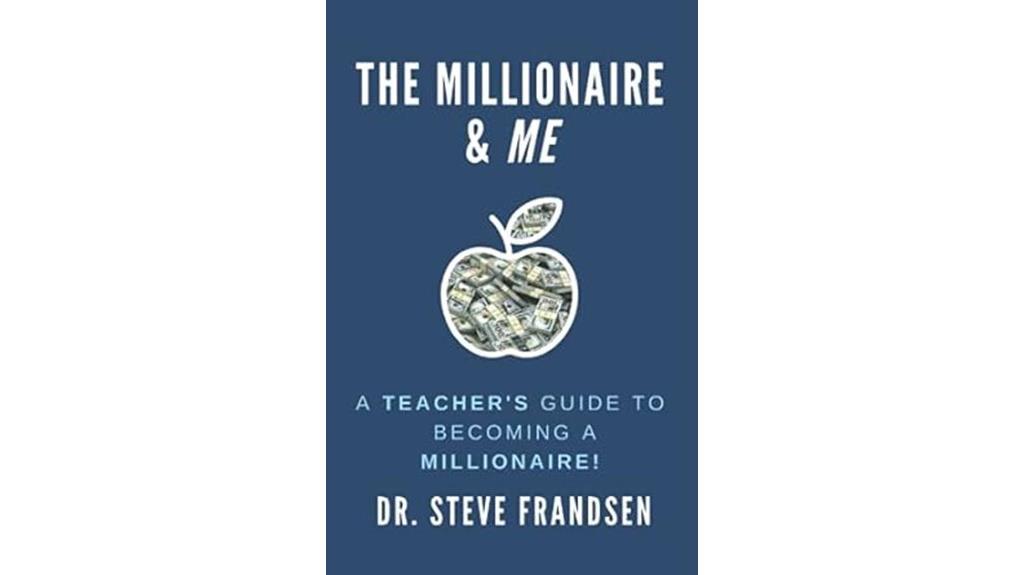
Educators, especially high school science teachers, will find “The Millionaire & ME: A Teachers Guide To Becoming A Millionaire” to be an invaluable resource. It offers simple, actionable steps to build wealth, emphasizing discipline, frugality, and consistent savings. The book highlights the financial benefits of the teaching profession, including retirement and pension strategies, motivating teachers to stay in their careers. Many share copies, discuss principles, and apply its advice to access earning potential. Clear, practical, and easy to follow, it empowers teachers to turn their modest income into long-term financial security and eventual millionaire status.
Best For: Educators, especially high school science teachers, seeking practical guidance to enhance their financial literacy and achieve long-term wealth.
Pros:
- Provides clear, actionable steps tailored for teachers to build wealth.
- Emphasizes discipline, frugality, and consistent savings for financial growth.
- Highlights the benefits of the teaching profession, including retirement and pension strategies.
Cons:
- Focuses primarily on teachers and may require adaptation for other professions.
- May oversimplify complex financial concepts for some readers.
- Some readers might find the strategies challenging to implement consistently without additional financial support.
The Least Likely Millionaire Book
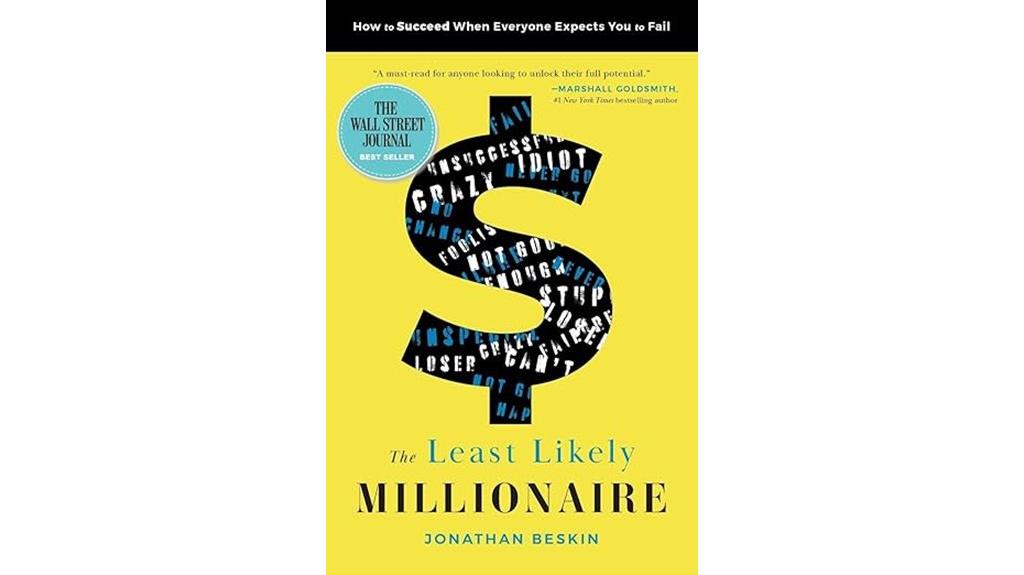
Looking for a story that defies the typical millionaire narrative? “The Least Likely Millionaire” stands out as an inspiring choice for anyone who doubts that success requires privilege or perfect circumstances. Jonathan Beskin’s journey from adversity to achievement proves grit, perseverance, and self-belief matter most. He openly shares struggles with mental health, self-doubt, and personal pain, making his story relatable and authentic. The book offers practical advice for starting and growing a business from scratch, emphasizing discipline, resilience, and a bit of luck. It’s a powerful reminder that anyone, regardless of background, can succeed with determination and perseverance.
Best For: aspiring entrepreneurs, individuals facing adversity, and anyone seeking motivation and practical guidance to build success from scratch.
Pros:
- Inspiring and authentic personal story that resonates with a wide audience
- Provides practical tools and actionable insights for starting and growing a business
- Emphasizes resilience, grit, and perseverance, encouraging self-belief and determination
Cons:
- May focus heavily on personal narrative, which might not appeal to those seeking purely technical business strategies
- Some readers might find the emphasis on luck less applicable or relatable
- The candid discussion of mental health struggles could be intense for sensitive readers
THE MILLIONAIRE NEXT DOOR

If you’re enthusiastic to understand the secrets that set millionaires apart from the rest, “The Millionaire Next Door” offers invaluable insights into their habits and mindset. This book reveals that many millionaires live modestly, prioritize saving, and invest wisely rather than flaunting wealth. They often come from humble backgrounds and focus on disciplined financial habits. The story of Hudson Stack and Amanda Dewhurst illustrates how true wealth isn’t about flashy spending but about balancing work, health, and relationships. These insights challenge common stereotypes, showing that anyone can build lasting wealth through consistent, intentional choices. Success is less about luck and more about smart, disciplined living.
Best For: individuals interested in personal development, financial literacy, and understanding the habits that lead to lasting wealth and success.
Pros:
- Provides practical insights into disciplined financial habits and lifestyle choices of millionaires.
- Emphasizes the importance of balancing work, health, and relationships for overall well-being.
- Challenges stereotypes about wealth, promoting a mindset of modesty and intentional living.
Cons:
- Focuses more on behavioral habits than detailed investment strategies.
- May oversimplify complex financial paths, leading to unrealistic expectations for some readers.
- The narrative primarily highlights American cultural contexts, which may not fully apply globally.
The Richest Man in Babylon (Readers Library Classics)

Fans of timeless financial wisdom and practical storytelling will find “The Richest Man in Babylon (Readers Library Classics)” an ideal read. This 1926 classic offers simple, powerful lessons on managing money wisely, like paying yourself first and saving at least 10%. Its engaging fables teach proven principles such as the “5 Laws of Gold” and “7 Cures for a Lean Purse,” emphasizing discipline, investing, and prudent spending. Many readers find it easy to understand and apply, especially early in their financial journey. The book’s clear, straightforward advice makes it a must-read for anyone looking to build wealth, develop good habits, and live a prosperous life.
Best For: individuals seeking straightforward, timeless financial advice and motivational stories to improve their money management skills and develop good saving and investing habits.
Pros:
- Easy-to-understand storytelling approach makes complex financial concepts accessible.
- Focus on fundamental principles like discipline, saving, and investing that are applicable across generations.
- Inspires personal growth and responsible money habits through simple yet powerful lessons.
Cons:
- Some readers may find the language and style a bit old-fashioned or simplistic.
- Lacks detailed, modern financial strategies or investment techniques.
- The allegorical fables may not appeal to those looking for in-depth financial analysis or technical guidance.
Factors to Consider When Choosing The Millionaire Next Door Book

When selecting The Millionaire Next Door, I look for clear and practical insights that I can easily apply. It’s important to contemplate the author’s credibility and how well the content relates to modern financial challenges. Additionally, I prefer books that are engaging and straightforward, making complex ideas easier to understand and use.
Content Depth and Clarity
Choosing a copy of The Millionaire Next Door with the right content depth and clarity is essential for making the most of its insights. I look for a book that explains financial principles clearly and straightforwardly, so I don’t get lost in confusing jargon. It’s important that the book strikes a balance between enough detail to be actionable and simplicity to stay understandable—no overwhelming technicalities. I also value real-life examples and case studies that bring concepts to life, making them easier to grasp and apply. The writing style should be accessible, avoiding unnecessarily complex language. Finally, concise summaries of key ideas help reinforce lessons and serve as quick references. When the content is clear and appropriately detailed, it makes applying the book’s lessons much easier and more effective.
Practical Application Tips
Selecting the right copy of The Millionaire Next Door involves considering how well it offers practical steps you can implement in your daily life. Look for editions that emphasize disciplined saving, frugal living, and long-term investing—these core principles help translate theory into action. Choose books that include clear, actionable advice like tracking expenses or setting specific savings goals, making it easier to develop real-world habits. Real-life case studies or examples can also deepen your understanding of applying strategies to your situation. Additionally, prioritize resources that explain the difference between income and wealth, highlighting behaviors that build wealth beyond earning a high salary. Finally, seek out updated insights that incorporate modern financial tools, ensuring the advice remains relevant in today’s economic landscape.
Author Expertise and Credibility
The credibility of The Millionaire Next Door largely depends on the expertise of its author, making it essential to evaluate their background carefully. An author’s credentials, research experience, and practical knowledge in personal finance and wealth building are key indicators of reliability. Credible authors typically have a strong track record of published works, relevant academic qualifications, or hands-on experience in finance or economics. The depth and accuracy of the book’s content often mirror the author’s expertise, ensuring that the advice provided is both sound and applicable. Recognized authorities frequently cite reputable sources and data, further boosting trustworthiness. Choosing a book authored by a well-regarded expert guarantees that the principles shared are based on solid evidence and real-world understanding, making it a valuable resource.
Relevance to Modern Finance
Despite the rapid changes in the financial landscape, many core principles from “The Millionaire Next Door” remain highly relevant today. The book’s emphasis on frugality, disciplined saving, and long-term investing still holds true, regardless of economic shifts or technological advances. Living below your means and practicing delayed gratification are timeless habits that support wealth building, even in today’s consumer-driven culture. While some data and examples may be outdated, the fundamental idea—that high income doesn’t automatically equal wealth—continues to resonate with modern financial advice. Updated editions and related literature reinforce that these core habits are effective tools for steering through contemporary economic challenges and achieving financial independence, making the book a valuable resource for today’s readers.
Readability and Engagement
When choosing The Millionaire Next Door, it’s important to contemplate how readable and engaging the book is, since these qualities can make a big difference in how much you get out of it. A highly readable book uses clear language and straightforward concepts, making complex ideas easier to understand. Well-structured chapters with logical flow and concise summaries help reinforce key points and aid retention. Incorporating storytelling, real-life examples, and anecdotes creates an emotional connection, making the material more relatable and memorable. Visual elements like charts and highlighted points also improve comprehension, especially for complex topics. A balanced approach that combines technical information with accessible writing appeals to both beginners and experienced readers, ensuring ongoing engagement and a richer learning experience.
Data and Examples Used
Choosing “The Millionaire Next Door” involves examining the data and examples it presents, which shape how relevant and trustworthy the insights are. While much of the research is from the 1990s, the core principles remain solid, emphasizing disciplined saving and modest lifestyles. The book uses real-life stories of self-made millionaires who defy stereotypes, highlighting behaviors that lead to wealth. It introduces classifications like Under Accumulator of Wealth (UAW) and Prodigious Accumulator of Wealth (PAW), based on their financial habits. Although some statistics are older, updated editions incorporate recent data, reflecting changing economic conditions. These examples and data points help me understand the traits and behaviors that contribute to lasting wealth, making the lessons practical and grounded in real-world success.
Cost and Accessibility
One of the most important factors to consider when selecting The Millionaire Next Door is its cost and how easily you can access it. You should check if the price fits within your budget, especially if you plan to buy multiple copies or editions. Think about the available formats—print, ebook, or audiobook—to match your preferred reading style and accessibility needs. It’s also smart to explore options through libraries, online retailers, or free resources, ensuring easy access without extra costs. Keep in mind that older editions or summaries might be cheaper but could lack recent insights valuable for today’s financial situations. Finally, compare prices across platforms to find the best deal while ensuring you’re getting a legitimate, high-quality copy.
Frequently Asked Questions
What Are Common Misconceptions About Millionaires’ Lifestyles?
Many people think millionaires live extravagantly and flaunt their wealth, but that’s just not true. I’ve learned that most are actually quite frugal, prioritizing saving and investing over lavish spending. They tend to live below their means and avoid flashy lifestyles. This misconception can lead others to believe wealth requires constant indulgence, but in reality, disciplined financial habits are what build lasting wealth.
How Does the Book Define True Wealth Versus Perceived Wealth?
When I think about true wealth versus perceived wealth, I picture someone with a modest car and a hefty savings account, not flashy jewelry. The book explains that true wealth is about financial independence and disciplined saving, not just showing off luxuries. I’ve learned that many millionaires live simply, focusing on building assets, while perceived wealth often comes from appearances that hide financial insecurity.
Are There Specific Habits That Distinguish Self-Made Millionaires?
When I look at what sets self-made millionaires apart, I see they stick to disciplined habits. They budget carefully, avoid unnecessary debt, and prioritize saving. They also focus on continuous learning and smart investing. These habits help them build wealth steadily over time. I’ve found that consistency and frugality are key, and it’s these small daily choices that make a big difference in achieving financial independence.
How Can Readers Apply the Book’S Insights to Their Own Financial Planning?
Think of your financial plan as a garden that needs regular tending. To apply the book’s insights, I focus on living below my means, just like watering a plant with care, and saving consistently. I set clear financial goals and avoid flashy spending, nurturing my wealth silently. These habits help my financial garden grow strong over time, turning small efforts into a lush, sustainable future.
Does the Book Address How to Maintain Wealth Long-Term?
You’re wondering if the book covers how to keep wealth over the long haul. I found that it emphasizes prudent financial habits, frugal living, and continuous savings, which are key to sustaining wealth. The authors stress discipline and smart investments, not just earning money but preserving it. So, yes, it offers valuable strategies to help you maintain and grow your wealth over time, ensuring long-term financial security.
Conclusion
Reading “The Millionaire Next Door” taught me that wealth isn’t about luck or flashy spending—it’s about discipline and smart choices. I once saw a neighbor save diligently and invest wisely, quietly building his fortune while others chased quick wins. Like tending a garden, wealth grows slowly but steadily when nurtured consistently. Remember, lasting riches come from simple, persistent habits—just like planting seeds and waiting for them to flourish over time.









